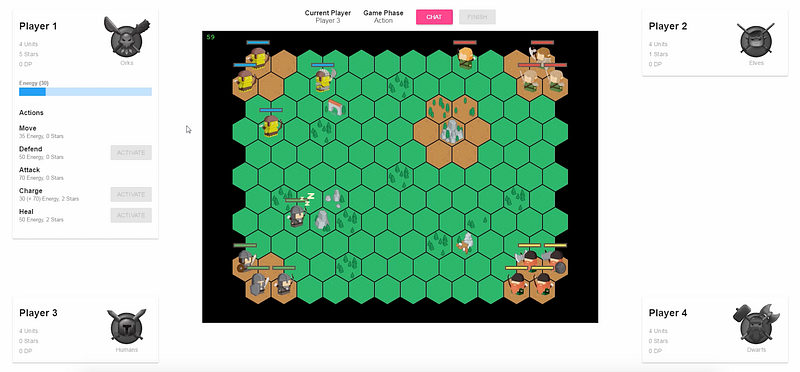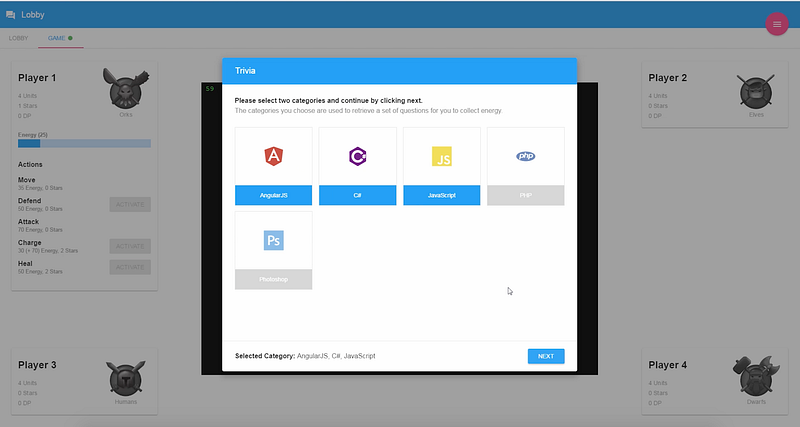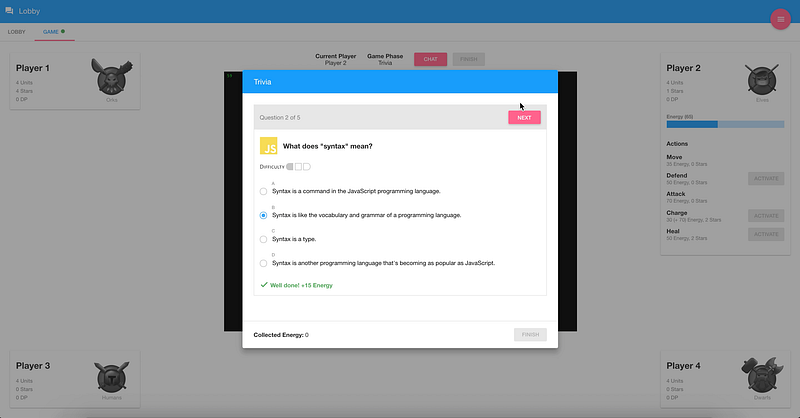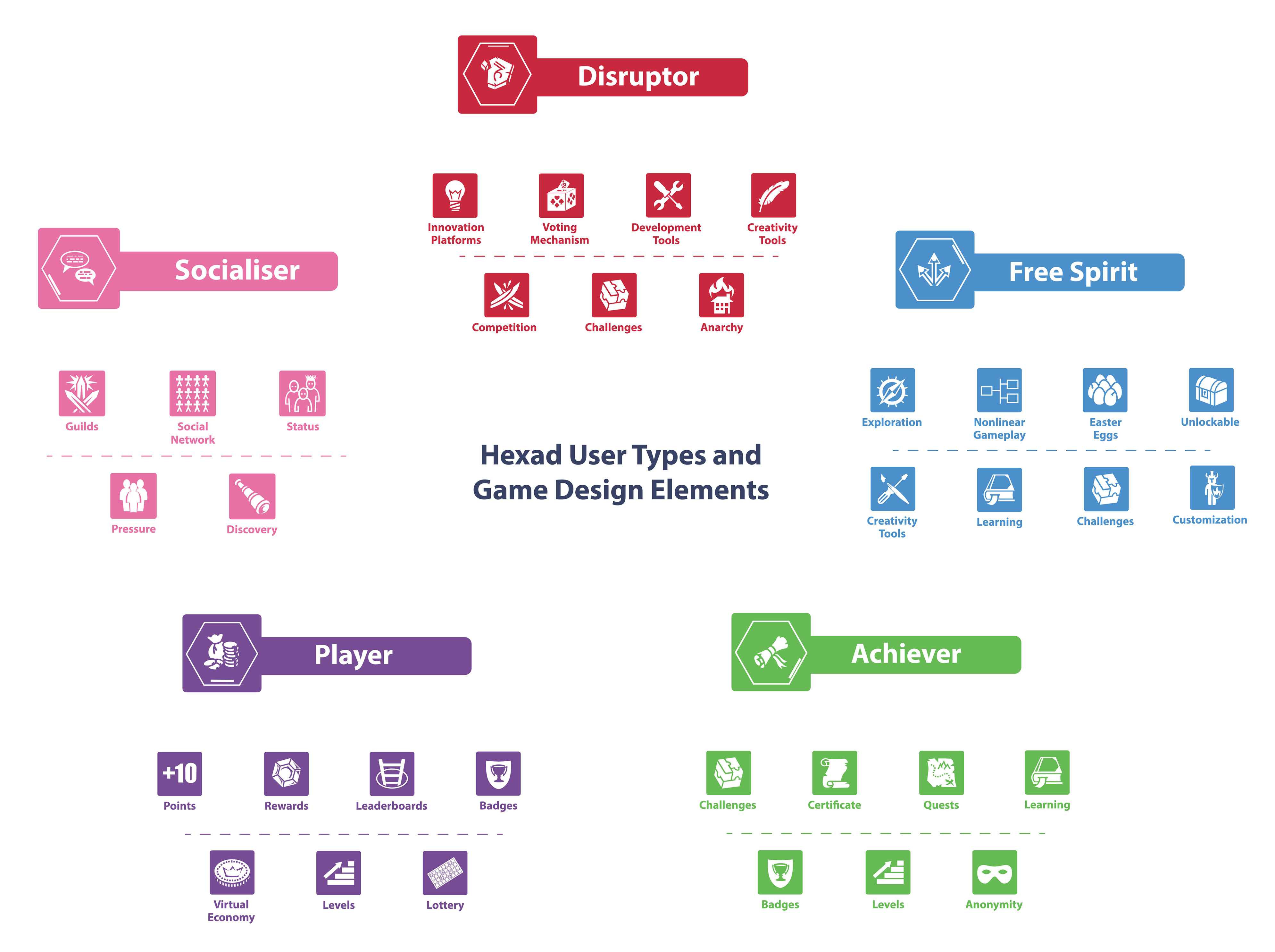Written by Dominic Elm, Dennis Kappen, Gustavo Tondello, and Lennart Nacke.
CLEVER will be demonstrated during the Student Game Design Competition at CHI PLAY ’16.
Knowledge management (KM) represents the process of effectively capturing, documenting, assimilating, sharing, and deploying organizational knowledge [1,2]. Focused aggregation of such knowledge is critical for maximizing organizational objectives, as well as the efficient and effective functioning of any enterprise. However, a main challenge for companies is the reluctance of their knowledge experts to share their intellectual capital [1,3]. Knowledge Management Systems (KMS) provide the information technology to store, retrieve, and share knowledge; however, users often lack the motivation to engage with them.
Observing this issue, Dominic Elm made the goal of his Master’s thesis to propose a solution to this problem using Gamification. Thus, he designed CLEVER, an online KMS that incorporates game elements to motivate and engage users. The system is composed of two parts: (1) an online knowledge repository, where employees can provide important knowledge to the company, and (2) a trivia strategy game that motivates players to interact with content from the knowledge repository.
Presently, we have implemented and tested a prototype of the learning component of CLEVER. It is a strategic, turn-based trivia game in a digital play space. The prototype incorporates several game elements, including movement, combat, competition, feedback, rewards (stars, energy, and domination points), exploration, and loss avoidance. The players’ goal is to eliminate all enemy units on the game’s digital board. The game can be played by a minimum of two and a maximum of four players who compete against each other on a single digital map, constructed from tiles.

CLEVER’s gameplay focuses on a trivia and an action phases. Players collect energy by answering questions with different levels of difficulty in the trivia phase. This collected energy can then be used to perform a game action (i.e., move, defend, attack, charge, or heal) in the action phase. If all questions are answered correctly, the player is awarded a star, which can be used for executing special actions in the game, such as charging and healing. Stars may be accumulated over time to be used with actions that are more expensive. Units represented as a token on the map are present as different types of units — archer, fighter, and tank. Each unit type differs in health points, attack, and movement range, giving players the opportunity to pursue individual strategies.


We conducted an exploratory focus group study with nine participants who played the game in three groups, to gather players’ thoughts, experiences, and motivations to use CLEVER. While individual impressions of the game were diverse, many lauded that strategy and trivia combined as game elements helped differentiate it from other trivia or strategy games. Therefore, this combination was effective in motivating players to interact with knowledge through trivia questions. Our preliminary study informed that gameful elements helped foster the employees’ intrinsic and extrinsic motivations to interact with a KMS. These motivations fostered player engagement with the gameful system and, thus, with knowledge from the repository, which may lead to improved learning. However, participants felt that this kind of gameful KMS is better for learning or reinforcing explicit rather than implicit knowledge.
Future work will extend this study and contribute to gamification research on KMS by further evaluating how CLEVER will affect the employees when they play it asynchronously in between their daily work activities instead of in a laboratory setting. Furthermore, we plan to design, implement, and test the other half of CLEVER: the gameful knowledge repository, which will be aimed at facilitating employees’ motivation to share new con-tent into the knowledge repository.
Publications
CLEVER will be demonstrated during the Student Game Design Competition at CHI PLAY ’16. You can find more information about CLEVER and the game prototype in the following publications.
- Dominic Elm et al. CLEVER: A Trivia and Strategy Game for Enterprise Knowledge Learning. ACM CHI PLAY ’16.
- Dominic Elm et al. CLEVER: Gamification and Enterprise Knowledge Learning. ACM CHI PLAY ’16.
References
- Babita Gupta, Lakshmi S. Iyer, and Jay E. Aronson. 2000. Knowledge management: Practices and challenges. Ind Manage Data Sys 100, 1: 17–21.
- William R King. 2009. Knowledge Management and Organizational Learning. Annals of Information Systems 4, 2: 3–13.
- Julia Mueller. 2015. Formal and informal practices of knowledge sharing between project teams and enacted cultural characteristics. Project Management Journal 46, 1: 53–68.
Dr. Gustavo Tondello was an instructor and support coordinator for the Cheriton School of Computer Science. He was a Ph.D. student at the University of Waterloo under the supervision of Dr. Lennart Nacke and Dr. Daniel Vogel and a graduate researcher at the HCI Games Group. He is a co-founder of MotiviUX and a member of the International Gamification Federation. His research interests include gamification and games for health, wellbeing, and learning, user experience in gamification, and gameful design methods. His work focuses on the design and personalization of gameful applications. His publications advanced the current knowledge on player and user motivations in games and gameful applications and introduced new frameworks and approaches to designing personalized gameful applications and serious games. He periodically blogs about gamification for the HCI Games Group and on his personal blog, Gameful Bits. Before coming to Canada, Gustavo earned his M.Sc. in Computer Science and his B.Sc. in Information Systems from the Federal University of Santa Catarina (UFSC) and worked for several years as a Software Engineer in Brazil. Gustavo is also a Logosophy researcher affiliated with the Logosophical Foundation of Brazil and North America.




 The Gamification User Types Hexad Scale
The Gamification User Types Hexad Scale
Leave a Reply